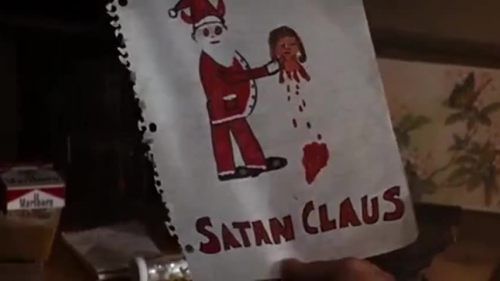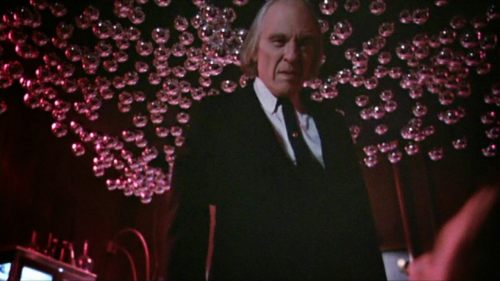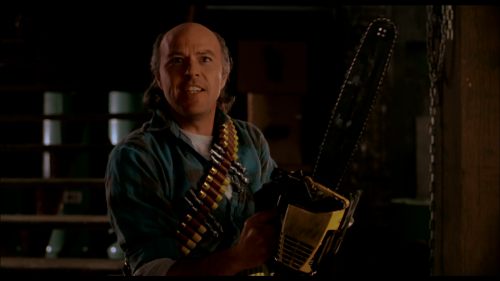A Look Back At The Deliberate Uncertainty Of The PHANTASM Films
As far as unlikely franchises go, Don Coscarelli's Phantasm has to be near the top of the list, at least for horror films. The 1979 film is a bizarre, fever dream of a movie that is more known for its nightmare imagery than characters or plotting, and yet a major studio (Universal, to be specific) backed a sequel nine years later -- a sequel that didn't break records but paved the way for two more installments over the next ten years, and garnered a fanbase that has been demanding a fifth film since. They got their wish out of nowhere last year, when it was revealed that a new film had already been shot and would be arriving in 2015. That movie, Phantasm: Ravager, hasn't surfaced yet, but based on what we know and what little we've seen, it seems to be in line with what we expect from our adventures with Reggie, Mike and The Tall Man
Those three characters have been in all four released installments, though one of them was briefly played by another actor (more on that later). However, the first film's plot involved a fourth: Mike's older brother Jody, whom we learn at the end of the movie died in a car wreck (OR DID HE?), and that most/all/none of what we had seen during the movie was a dream, or Mike's imagination, or something else entirely. See? There's a lot of uncertainty, a lot of things left up for debate -- the sort of things you see in standalone movies, not the first installment of a franchise that has spanned over 30 years. Some of those questions were (fuzzily) answered in the sequels, others still leave audiences baffled, but it doesn't matter. The continuity of the creator and (most of the) cast has allowed the tone of all of the films to remain consistent, so even when there's a giant plot hole somewhere along the line, it certainly doesn’t affect the quality -- or enjoyability -- of the series.
And few can argue that what the film lacks in coherency it more than makes up for in sheer nightmare fuel; many a young horror fan was left permanently scarred either by the film's iconic silver spheres that can drill through anything (including heads), or the Tall Man (Angus Scrimm) shouting "BOYYYYYYYYYYY". The basic plot is right out of a Goosebumps-type novel; a young boy (A. Michael Baldwin) has had a rough couple of months -- his parents died in a car wreck, and now his older brother/guardian/hero Jody (Bill Thornbury) is about to move away. Worse, he's convinced that he has seen creepy goings-on at the nearby mausoleum, including the robbing of his parents' graves, and no one believes him. Much of the movie consists of Mike trying to get Jody or ice cream man/buddy Reggie (Reggie Bannister) to see what he has seen, as he is convinced that the Tall Man is using their parents' bodies for nefarious purposes. It's funny that the film's basic plot can be described so easily, because when watching it one might often wonder if there's any plot at all, as Coscarelli seems more interested in freaking viewers out than telling a traditional story. At the end, just after the Tall Man has been defeated (a fight that left Reggie dead), we're given a huge shock twist -- Mike wakes up from a bad dream, and the very much alive Reggie tells him that Jody died in the same car wreck as his parents, and thus the Tall Man, the spheres and everything else we've seen was all in his head. Reggie is now his guardian, and sends him upstairs to grab something, allowing Coscarelli to pull one more great scare on us -- the Tall Man is in their house! It wasn't a dream after all!
Or, uh, was it? In the Phantasm movies, even that which seems like a given is revealed as an uncertainty eventually. Phantasm II picks up directly from its predecessor (rare for a sequel released nearly a decade later), with the Tall Man threatening Mike in his bedroom, and then we see what happens next: Reggie blows up the house in order to rescue Mike from the Tall Man’s grip (this actually works!). But later Reggie tells him that scene, too, was just a dream, re-confusing the situation all over again. Well, whatever happened that night, Mike is left traumatized by the experience, and he’s placed in an institution. When he's released, he's not only "saner," but he's become James LeGros, leaving original actor Baldwin out of the movie entirely (a double was used for the opening scene). As the story goes, Universal wanted to recast both Baldwin and Bannister for their bigger budgeted sequel, but Coscarelli fought them on it until a compromise was reached -- he could keep one of them. Maybe a coin was flipped or maybe the director just realized Bannister was a better actor, but either way, Baldwin had to sit the sequel out. As did Bill Thornbury as Jody, though it seems he was never really part of the plot anyway -- his resurrection doesn’t arrive until the next film.
During the time Mike spent in the institution, The Tall Man had successfully wiped out most of the world (something we're only told; visually all we see is a lack of extras and a single ghost town), and the plot of this first sequel finds Mike and Reggie gearing up (including the creation of a four-barrel shotgun that is to Reggie what the chainsaw is to Ash) and following his trail of destruction, hoping to stop him for good. They are joined by Liz, who has dreams of Mike and uses a sort of telepathy to lead them to her, and Alchemy, a random hitchhiker that Reggie picks up (Reggie's horniness is as much of a character in these movies as Reggie himself). Eventually The Tall Man kidnaps Liz, a lot of spheres fly around, there's a crazy priest and a pair of creepy morticians in there somewhere, and did I mention the alternate dimension? And yet, Phantasm II is the most coherent and commercial of the series, for obvious reasons. Sure, it has to be the weirdest damn thing Universal released that decade (it was their lowest budgeted for sure), but when stacked up against the other films in the series, it's not just LeGros that makes the film feel more typically Hollywood. The scope is a bit larger, the action cleaner and the plot more straightforward than the other films in the series. It's by no means a bad film, and in fact it's many fans' favorite, but it is definitely the anomaly in the series.
The third film, subtitled Lord of the Dead, brought the series back to its roots. Jody returned, albeit mostly in sphere form (don't ask), and Baldwin came back to the role of Mike (the actor holds a nasty grudge against LeGros and Phantasm II in general; you can hear his seething rage on the commentary). Sometimes I think this is the best sequel, as it offers the bigger scope of the first sequel with the loopiness that film's studio mandates wouldn't allow, but other times I feel its narrative is a bit too much like its predecessor, making it feel like a remake rather than a sequel. But if you're a Reggie fan, there's no doubt to this film's appeal -- he's in pretty much every scene, and he's saddled with a (not too annoying) kid sidekick, giving him something new to do while continuing his misadventures with women. It's also got the most action of any of the films in the series, though it sidelines the Tall Man for longer stretches, so that might not sit as well with some viewers.
Our favorite grave robber comes back into the forefront with the fourth film, Phantasm: Oblivion, in which we finally learn his name (Jebediah Morningside) and some of his backstory. Whether the character needs that backstory is debatable, but after the similar previous two films, at least this aspect sets Oblivion apart quite markedly. Adding to the film's uniqueness is the fact that a good chunk of it is comprised of unused footage from the original, a trick rarely seen in cinema. Apparently, Coscarelli's first cut of the 1979 film was around three hours, and it was literally cut in half (which might explain why it's so confusing at times -- perhaps the film’s perplexity wasn't even the original intent), so there's a lot of leftover footage, quite handy for a filmmaker trying to make a new movie with underwhelming funds to do so. Some of the footage feels a bit forced, like when Mike recalls a "last perfect day" in which Jody doesn't appear and his main action is stealing an ice cream from Reggie's truck, almost assuredly a deleted bit of atmosphere/padding originally, and is now for some reason a really strong memory for a man several years later. But when the gimmick works, it's a remarkable feat, and adds immensely to the film's return to a more dream-based logic after two more or less coherent adventures.
The other qualities that distinguish Oblivion aren't exactly complimentary. The even further reduced budget makes the story/world feel too small, especially in the Mike scenes where he's just driving around or walking in the desert. And after a while, all of the old footage begins to wear a bit on the viewer. It's slightly easier to swallow now that we do indeed have a fifth film on the way, but for a period there it seemed like Oblivion would be our last time with these characters, and it was a bummer that so much of it was spent in the past, instead of progressing their story and delivering a big finale. It also lacks the strong continuity of the other sequels; the kid from III isn't even mentioned (his fate was ambiguous at the end of that film; a death scene was planned but never shot due to the budget restraints), and Reggie seems like he cares more about his car than his friends, as if it had been five years instead of five minutes since he was last fighting by their side.
But not those minor blemishes, nor the news that for the first time ever Coscarelli would be handing over the directorial duties to someone else (David Hartman, who worked on John Dies at the End with Coscarelli, directs this time, with the two men sharing scripting credit), has dampened "Phans" excitement for the upcoming Ravager, said to be the series' final installment. I can't blame the filmmakers for calling it a day; Scrimm is 88 years old at this point and probably can't run down mausoleum hallways for much longer, and I don't think there's a person alive who would want to see him get recast, or watch a Phantasm film without its trademark villain. It's a shame that Coscarelli didn't call the shots himself when it came time to finish his baby, but his involvement (and the participation of the full cast, including Kathy Lester returning as the mysterious Lady in Lavender for the first time since the original) means that it's in good hands, not some cheap cash-in coasting on the name brand alone. Time will tell whether Ravager was worth the seventeen-year wait, but if there's one thing we can count on by now, it’s that there's no such thing as a "phorgettable" Phantasm.



